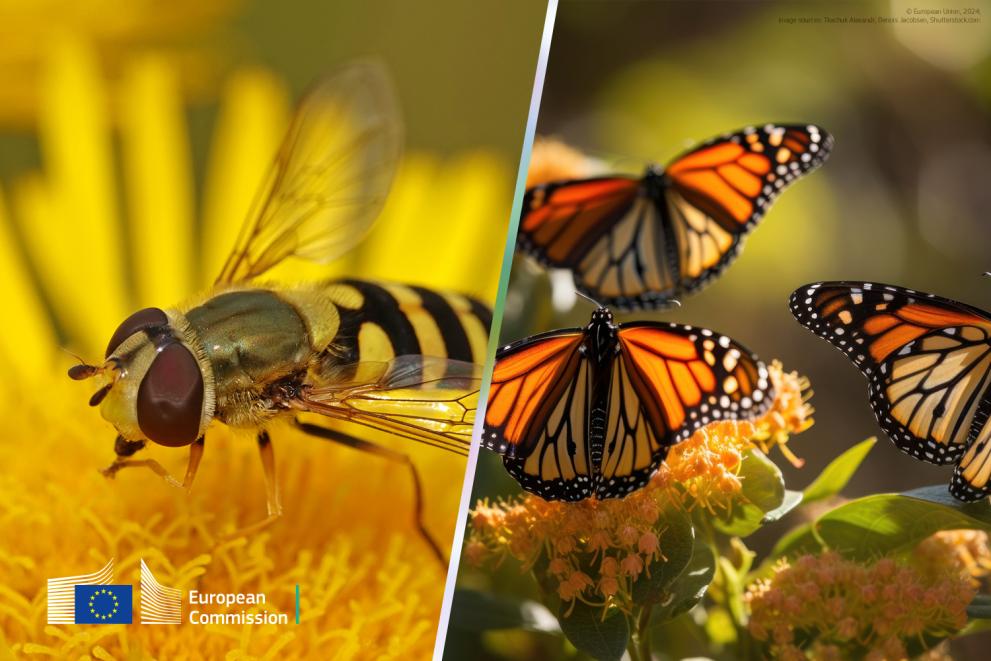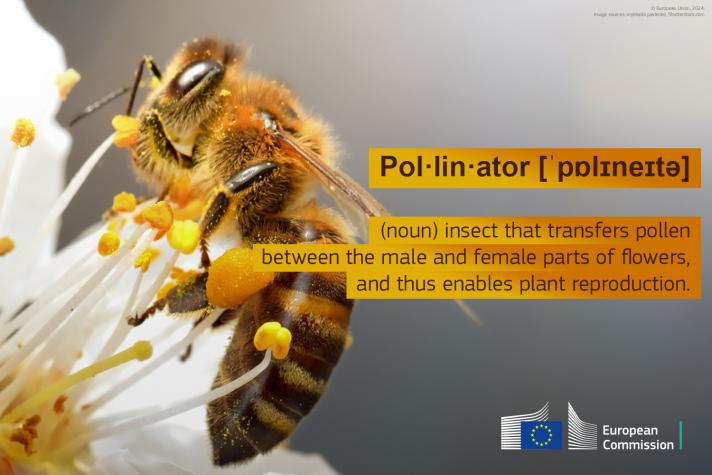
In Europe, around four in five wild-flower and crop species depend on pollinators.
It has long been considered that most pollination was provided by honeybees. However, recent research has shown that wild pollinators, such as hoverflies, butterflies, moths, and some beetles, also play a vital role in crop pollination.
Today, one in three bee, butterfly and hoverfly species are disappearing in the EU. Pollinator loss is one of the largest threats to EU nature, human wellbeing, and food security.
In 2023, the European Commission presented 'A New Deal for Pollinators' to tackle the alarming decline in wild pollinating insects in Europe, revising the 2018 EU Pollinators Initiative.
The renewed initiative set out actions to be taken by the EU and the Member States to reverse the decline of pollinators by 2030. It complemented the Nature Restoration Law and is a key part of the Biodiversity Strategy 2030, the Farm to Fork Strategy and the European Green Deal.
Research into pollinating insects is essential to safeguard these species and their invaluable contribution to the environment and the food at our table. Several EU-funded projects managed by the European Research Executive Agency contribute to the Commission’s effort to halt and reverse pollinator decline and restore their diversity.
Wild pollinators inspiring policymakers
Pollinator research can help public and private initiatives to halt and reverse biodiversity decline and thus enhance ecosystem services and their resilience. The Safeguard project brings together world-leading researchers, NGOs, industry and policy experts to contribute to Europe’s capacity to reverse the losses of wild pollinators.
The project works to expand current knowledge on the status and trends of European wild pollinators. Its goal is to inspire the development of management and policy guidelines for the public and private sectors to safeguard wild pollinators and the benefits they provide.
Acknowledging that global change requires global solutions, Safeguard includes Chinese partners to address the topic in a different geographical and climatic context.
Find out more about Safeguard.
Restoring pollinator habitats across Europe
Agricultural land use is crucial for feeding humanity. Therefore, the decisions on how farmers manage their land are a major driver for biodiversity change.
To counteract pollinator and pollinator services’ decline, RestPoll aims to permanently restore pollinator habitats in Europe and enhance their connectivity. This is important not only for agricultural yields and food security, but also for wild plants and other organisms that depend on pollinators.
The project combines the expertise of natural and social scientists, NGOs, businesses, and ministries. Central to RestPoll is the establishment of a Europe-wide network of pollinator restoration case-study areas and Living Labs, which are unique hubs for experimentation, demonstration, and mutual learning.
Find out more about RestPoll.
Better understanding of pesticide-pollinator interaction
Plant protection products, a.k.a. pesticides, are one of the primary triggers of pollinator decline. However, it is crucial to first address the knowledge gaps and procedural limitations to current pesticide risks before introducing meaningful improvements.
The PollinERA project aims to reverse pollinator population declines and reduce the harmful impacts of pesticides through improved pesticide risk assessment. The project aims to fill the current data gaps to predict the sources and routes of pesticide exposure and impact on pollinators.
Find out more about PollinERA.
Chemical exposure varies geographically, across and inside cropping systems, as well as among pollinators. WildPosh is an EU-funded multi-actor, transdisciplinary project whose mission is to enhance the risk evaluation of wild pollinators pesticide exposure. The project is doing fieldwork in four countries (Germany, England, Estonia, and Spain) representing the main European climatic regions.
Find out more about WildPosh.
Learn more about EU’s role in protecting wild pollinators:
Details
- Publication date
- 1 July 2024
- Author
- European Research Executive Agency

